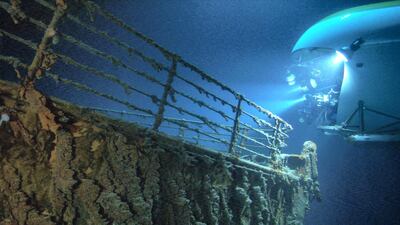In the last minutes before the damaged Titanic slipped beneath the waves, wireless operator Jack Phillips tapped out “Come quick. Engine room nearly full” before his radio set finally fell silent.
After 108 years under the sea, salvage experts have raised the remarkable prospect that the state-of-the art Marconi transmitter used by Mr Phillips on that fateful night can be raised from four kilometres down in the north Atlantic and restored to working order.
But the plans have sparked controversy because of the prospect of disturbing the world’s most famous wreck where some 1,500 of the 2,224 passengers and crew died after the ship struck an iceberg on April 15, 1912.
“Titanic’s Marconi wireless telegraph apparatus literally represents the actual voice of Titanic and as such, should be recovered from the wreck as a matter of responsible stewardship,” according to legal documents filed by the US company with salvage rights for the wreck.
“If recovered it is conceivable that it could be restored to operable condition… Titanic’s radio – Titanic’s voice – could once again be heard, now and forever.”
While the company RMS Titanic Inc has collected items scattered around the wreck site, an attempt to retrieve items from the radio operators’ “Silent Cabin” would represent the first attempt to retrieve an object from within the ship, according to the UK’s Telegraph newspaper.
“The idea that a vested connection would warrant pilfering and pillaging what is essentially a tomb, I think it’s entirely misguided,” Gavin Robinson, an MP in the Northern Irish capital Belfast, where the ship was built, told the newspaper.
Details of the planned salvage operation came as the UK hailed an agreement that seeks to protect the wreck from explorers and tourists. An international treaty to limit access was signed by Britain in 2003 but only ratified by the United States last year.
"The UK will now work closely with other North Atlantic States to bring even more protection to the wreck of the Titanic," said British maritime minister Nusrat Ghani in a statement.
The agreement allows the two governments to issue licences to recover items and the RMS Titanic is set to make its case in a US court next month to be allowed to use a remotely operated submarine to recover the radio and its components.
The wireless set received news from other ships warning of the likelihood of encountering ice and the captain briefed officers about the threat just nine hours before the disaster. After the collision it was sole method of communication to nearby ships that allowed hundreds to be saved. The wireless operator, Jack Phillips, died in the wreck.
The US-based company said that the ship’s structure has deteriorated close to a state where it can no longer protect the radio. It was “still retrievable and intact as of this writing, but at imminent risk of being lost,” according to the legal documents seen by the National.


